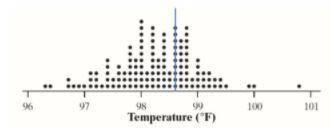
Advanced Placement (AP), 22.03.2021 08:40 SakChan8367
Do You Have a Fever? Sometimes when you’re sick, your forehead feels really warm. You might have a fever. How can you find out whether you do? By taking your temperature, of course. But what temperature should the thermometer show if you’re healthy? Is this temperature the same for everyone?
Several years ago, researchers conducted a study to determine whether the “accepted” value for normal body temperature, 98.6°F, is accurate. They used an oral thermometer to measure the temperatures of a random sample of healthy men and women aged 18 to 40. As is often the case, the researchers did not provide their original data.
Allen Shoemaker, from Calvin College, produced a data set with the same properties as the original temperature readings. His data set consists of one oral temperature reading for each of 130 randomly chosen, healthy 18- to 40-year-olds.1 A dotplot of Shoemaker’s temperature data is shown below. We have added a vertical line at 98.6°F for reference.
Exploratory data analysis revealed several interesting facts about this data set:
• The mean temperature was x=98.25F.
• The standard deviation of the temperature readings was sx = 0.73°F.
• 62.3% of the temperature readings were less than 98.6°F.
Based on the results of the study, can we conclude that “normal” body temperature in the population of healthy 18-to-40-year-olds is not 98.6°F?
Case Closed
1. If “normal” body temperature really is 98.6°F, we would expect that about half of all healthy 18- to 40-year-olds will have a body temperature less than 98.6°F. Do the data from this study provide convincing evidence at the α = 0.05 level that this is not the case?
2. The test in Question 1 has power 0.66 to detect that the actual population proportion is 0.60. Describe two changes that could be made to increase the power of the test.
Do the data provide convincing evidence that average normal body temperature is not 98.6°F? The computer output below shows the results of a one-sample t test and a 95% confidence interval for the population mean μ.
[One-Sample T image goes here]
3. What conditions must be satisfied for a one-sample t test to give valid results? Show that these conditions are met in this setting.
4. Explain how the P-value and the confidence interval lead to the same conclusion for the significance test.
5. Based on the conclusion in Question 4, which type of error could have been made: a Type I error or a Type II error? Justify your answer.



Answers: 2
Another question on Advanced Placement (AP)

Advanced Placement (AP), 24.06.2019 07:30
Which of these statements properly demonstrates the angle addition postulate for the m∠afc m∠afc ? a. m∠afc=m∠afb+m∠bfd m∠afc=m∠afb+m∠bfd b. m∠afc=m∠afb+m∠bfc m∠afc=m∠afb+m∠bfc c. m∠afc=m∠cfd+m∠dfe m∠afc=m∠cfd+m∠dfe d. m∠afc=m∠afb+m∠dfc+m∠cfb m∠afc=m∠afb+m∠dfc+m∠cfb
Answers: 2

Advanced Placement (AP), 25.06.2019 23:00
Which of the following terms refers to a promise made to lenders by a borrower? question options: record covenant bargain investiture
Answers: 1

Advanced Placement (AP), 26.06.2019 07:30
What type of commercial speech is not protected by the 1st amendment?
Answers: 1

Advanced Placement (AP), 26.06.2019 08:00
Based on the graph, how is coal consumption likely to affect future generations? a. the higher our current rate of consumption, the less coal will be available in the future. b. current rates of consumption are irrelevant because new coal will form in the future. c. the lower our current rate of consumption, the more slowly coal will be replenished for the future. d. regardless of current rates of consumption, coal will always be available.
Answers: 1
You know the right answer?
Do You Have a Fever? Sometimes when you’re sick, your forehead feels really warm. You might have a f...
Questions





Mathematics, 20.09.2020 06:01


Physics, 20.09.2020 06:01

Mathematics, 20.09.2020 06:01




English, 20.09.2020 06:01

Mathematics, 20.09.2020 06:01

English, 20.09.2020 06:01



History, 20.09.2020 06:01

Mathematics, 20.09.2020 06:01

Health, 20.09.2020 06:01



